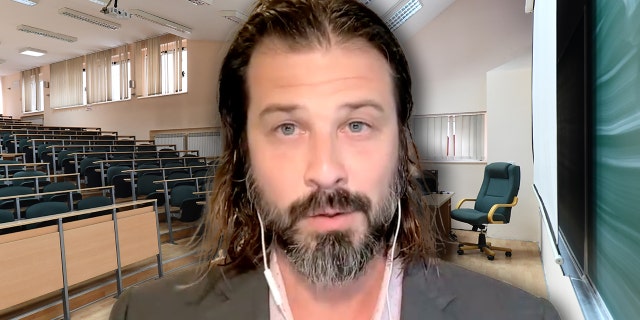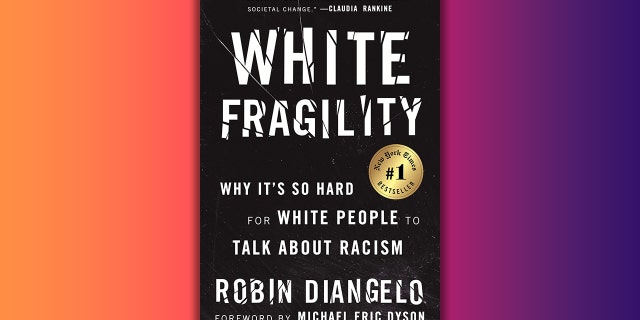A professor is suing Pennsylvania State University for race discrimination after he was subjected to instruction that the English language is racist and the embodiment of “White supremacy,” along with additional tirades against White people in professional development trainings, according to a lawsuit.
Professor Zack De Piero “was individually singled out for ridicule and humiliation because of the color of his skin,” the lawsuit, filed by The Foundation Against Intolerance and Racism (FAIR), said.
De Piero was an English professor at Penn State Abington.
“When he complained about the continuous stream of racial insult directed at White faculty in the writing department, the director of the Affirmative Action Office told him that ‘There is a problem with the White race,’ that he should attend ‘antiracist’ workshops ‘until you get it,’ and that he might have mental health issues,” the lawsuit alleged.

Some of the workshops included a presentation captioned “White Teachers are a Problem,” according to the lawsuit.
“The ‘White Teachers are a Problem’ video imposed on Penn State faculty… associated ‘White supremacy’ with all the evils of the world,” according to the suit.
De Piero explained in an interview that he was expected by the university to submit to antiracist brainwashing and doctrine, particularly that he as a White person was inherently flawed on the basis of history.
He said the university wanted him to believe that “as a White individual, I’m somehow responsible for all the injustices and suffering currently in the world and in the history of the world.”
De Piero continued, “I think there is almost a religious, cult-like environment where you had this Original Sin. In this case, I’m White. I need to repent for that sin. I need to keep going to these [trainings], keep doing the work… I think they were waging a psychological war campaign and they’re trying to break people. And they almost broke me. But they didn’t.”
His direct report in the English department, Liliana Naydan, “expressed her view that racism practiced against White faculty and students is legitimate,” according to the lawsuit. Naydan did not immediately respond to a request for comment.

The lawsuit alleged Nayden tried to coerce faculty to introduce equity into the grading process to ensure there weren’t disparities by “penaliz[ing] students academically on the basis of race.”
“Defendants’ bigotry manifests itself in low expectations. They do not expect Black or Hispanic students to achieve the same mastery of academic subject matters as other students and therefore insist that deficient performance must be excused,” the lawsuit said. “Second, Defendants’ bigotry manifests itself in overt discrimination against students and faculty who do apply consistent standards, especially White faculty.”
An equity administrator named in the suit, Alina Wong, engaged in breathing exercises in one session and suggested White staff needed to hold their breath longer than people of color in order to “‘feel the pain’ that George Floyd endured,” according to the lawsuit.
“De Piero and other faculty were thus singled out, caused to experience discomfort, and feel ‘the pain’ on the basis of their skin color,” the lawsuit said. Wong no longer works at Penn State; she is currently the vice president for institutional equity at Macalester College. She did not immediately respond to a request for comment.

Another professional development video said that “White English… kills people of color,” according to the suit.
De Piero’s direct report – Naydan – similarly “instructed her writing faculty to teach that White supremacy exists in language itself, and therefore, that the English language itself is ‘racist’ and, furthermore, that White supremacy exists in the teaching of writing of English, and therefore writing teachers are themselves racist white supremacists,” the suit said.
She also allegedly “endorsed a… view” that racism against White people isn’t racism.
The suit added Penn State maintained a “Diversity, Equity, and Inclusion” webpage where it “disseminated racist tirades against White faculty and students on the basis of their race,” the lawsuit said.
Examples included: “White Rage,” “White immunity” and “White Fragility,” according to the suit.
De Piero told reporters that he was especially offended because throughout his career he had always worked with underprivileged and marginalized communities, in both employment and volunteering opportunities.

“How dare you demean anybody based on their natural characteristics that they have no control over,” De Piero said.
The professor added that the experience in the alleged racially hostile work environment took an emotional toll on him, and he relied on his family and friends for support.
“They were seeing me go through this stuff and they’re all very concerned about me,” he said. “I really honestly feel for people who don’t have that kind of support network. I don’t see how you could get through something like this alone. I really don’t.”
The professor added that he never wants his daughter to go through what he went through, and it pushed him to take action.
” I remember there was one night I was putting her to bed, sort of like wondering what she was going to be in life when all this was happening. And I remember thinking… if she wants to be a teacher, I don’t want her to ever have to enter this kind of work environment and be made to be feel like [she’s] somehow professionally incompetent or morally inept simply because the color of her skin,” he said.
When De Piero attempted to raise his concerns about being allegedly subject to a hostile work environment on the basis of his race vis-à-vis the mounting professional development sessions and workshops, he was met with retaliating complaints and a negative performance review, the lawsuit said.

Penn State also officially warned De Piero that “dissenting from Penn State’s race-based dogma” would result in “disciplinary action,” the lawsuit said.
The professor ended up leaving his position.
“Penn State actively treated De Piero as the problem, suggesting mental health treatment and disciplining him for bullying when he dared to complain. As a result, De Piero’s only option to escape the hostile environment was to leave Penn State. This constructive termination occurred on August 2, 2022,” the lawsuit said.
Penn State was contacted for comment, and they said they will not comment on ongoing litigation.

